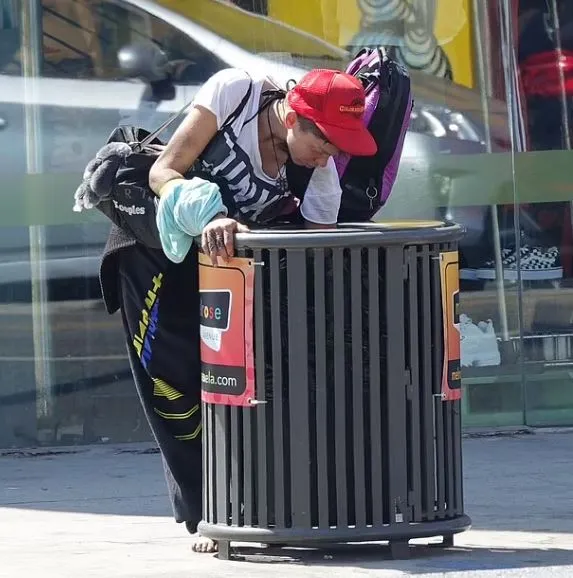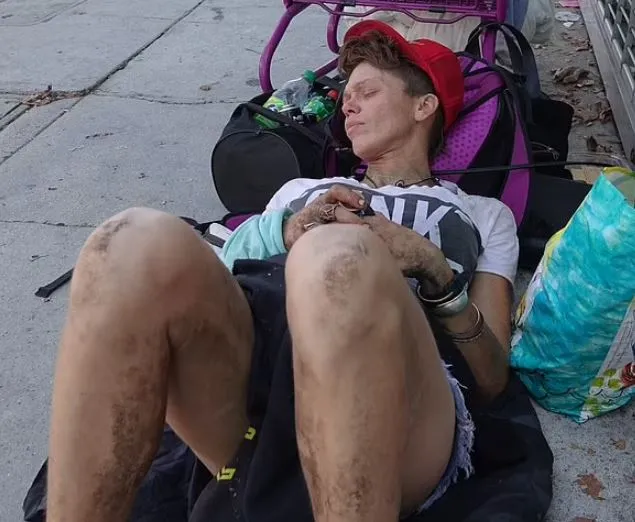Loni Willison’s story is one of heartbreak, resilience, and the harsh realities of life’s unpredictability.
Once a celebrated fitness model and the wife of Baywatch star Jeremy Jackson, she graced red carpets and magazine covers.
Today, her life is a stark contrast—marked by homelessness, mental health struggles, and survival on the streets of Los Angeles.
Her journey from fame to hardship is a cautionary tale, shedding light on the devastating effects of abuse, addiction, and untreated mental illness.

The Rise of Loni Willison: A Fitness Icon
Born on May 21, 1983, in Hemet, California, Loni Willison had a promising future. Her striking looks, coupled with her dedication to fitness, quickly catapulted her into the spotlight.
She appeared on the covers of renowned fitness magazines such as Glam Fit and Iron Man Magazine, earning her a dedicated following in the fitness world.
Loni’s personal life seemed equally dazzling. In December 2012, she married Jeremy Jackson, best known for his role as Hobie Buchannon on Baywatch.
Together, they became a glamorous Hollywood couple, attending star-studded events and basking in the limelight. To the outside world, their lives appeared perfect—full of glitz, charm, and endless opportunities.
The Hidden Struggles: A Toxic Marriage
Behind the scenes, Loni and Jeremy’s marriage was far from the fairy tale it appeared to be.
Their relationship was plagued by toxicity, emotional turmoil, and, as Loni later revealed, physical abuse.
She accused Jeremy of violent outbursts that left her with broken ribs and emotional scars.
Their marriage unraveled in 2014 when Loni decided to leave, ending a tumultuous chapter in her life.
Jeremy Jackson faced his own set of challenges, including struggles with substance abuse and brushes with the law.
In 2015, he was sentenced to jail, further highlighting the chaos that surrounded their lives. While Jeremy attempted to rebuild his life, Loni’s journey took a far darker turn.

Loni Willison, a former fitness model, became homeless after struggles with abuse, addiction, and mental health. Image Credits: Getty
The Downward Spiral: From Stability to Homelessness
After her divorce, Loni’s life began to spiral out of control. By 2016, she experienced a severe mental breakdown, which she described as feeling like she was being “electrocuted” in her home.
Desperate to escape these delusions, she turned to crystal meth, believing it was the only way to numb her torment.
Her mental health struggles led to the loss of her job at a cosmetic surgery center, leaving her unable to pay rent. Soon after, she was evicted and found herself homeless.
Loni’s life of stability and success had completely unraveled, leaving her to navigate the harsh realities of life on the streets.

Her marriage to Baywatch star Jeremy Jackson ended in 2014 after allegations of physical abuse. Image Credits: Getty
Life on the Streets: A Daily Struggle for Survival
By 2018, heartbreaking images of Loni Willison surfaced. Once known for her radiant beauty, she was now nearly unrecognizable—her glamorous appearance replaced by a disheveled, weathered look.
She was photographed digging through dumpsters for food in Los Angeles, a stark reminder of how far she had fallen.
Living on the streets presented constant dangers. Loni admitted to deliberately keeping herself dirty to avoid unwanted attention, saying, “The dirtier I am, the better.”
She even cut her own hair to blend in and deter attackers. Despite these precautions, she faced regular threats, including theft and physical violence.
When friends and family reached out to offer help, Loni declined, insisting she was fine. “I have everything I need,” she said, though her circumstances painted a different picture.
Her refusal to accept assistance stemmed, in part, from her mental health struggles, which made it difficult for her to trust others or envision a way out.
The Desire for a Fresh Start
Despite her hardships, Loni expressed a longing for change. In a rare moment of vulnerability, she admitted, “Yes, I do want to get off the street. I want a new life.”
Her words offered a glimmer of hope, suggesting that she hadn’t given up entirely on the possibility of rebuilding her life.
Loni’s tragic story serves as a powerful reminder of the complex interplay between abuse, mental illness, and addiction. Her fall from grace underscores the urgent need for compassion, understanding, and effective support systems for those struggling with similar issues.

After a mental breakdown in 2016, Loni lost her job, became evicted, and turned to life on the streets. Image Credits: Getty
The Broader Impact: A Cautionary Tale
Loni Willison’s journey highlights the fragility of success and the devastating impact of untreated mental health issues.
Once celebrated for her beauty and accomplishments, she now represents the countless individuals who fall through the cracks of society’s safety nets.
Her story raises important questions about how we, as a society, address mental health and addiction.
It’s a sobering reminder that fame and fortune offer no immunity from life’s hardships. Without adequate support and intervention, even the brightest stars can find themselves struggling to survive.
Finding Resilience in Tragedy
Amid the heartbreak of Loni’s story, there is also a lesson in resilience. Her ability to endure life on the streets, despite unimaginable challenges, speaks to her inner strength.
While her circumstances are dire, her desire for a new beginning offers a sliver of hope—a reminder that it’s never too late to seek help and rebuild.
Conclusion
Loni Willison’s fall from grace is both shocking and heartbreaking. Once a fitness icon and part of a glamorous Hollywood couple, she now fights for survival on the streets of Los Angeles.
Her story is a powerful testament to the destructive effects of abuse, addiction, and mental illness—and the importance of compassion and support in addressing these issues.
As we reflect on Loni’s journey, we’re reminded of the human stories behind the headlines.
Her life may have taken a tragic turn, but it also serves as a call to action: to prioritize mental health awareness, to support those in need, and to recognize that everyone deserves a chance at redemption.
While her struggles are far from over, her resilience offers a glimmer of hope for a brighter future.





